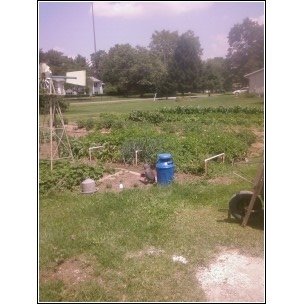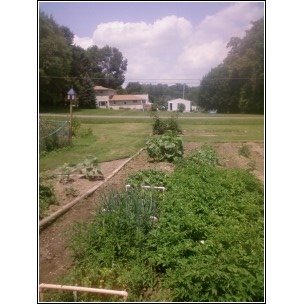Today while reading yet another news story about the affects of pesticides and herbicides on our envoirnment and us, I started thinking about why such things are produced. As much as I want to follow the crowd and point my finger at the chemical companies and large scale farmers who use these products, I can't without thinking WHY these chemicals exist and are used. Yes I know, chemicals are evil, and yes I know, there are alternative ways to farming, but for now, I am going to look at the big picture.
As I have written in many previous posts, there was a time when EVERYONE produced some, if not all, of their own food. This could have been on a farm, on the prarie, or the man in the mountains eating elk and wild berries. Everyone was responsible for themselves. But as the population grew, towns grew into cities, and people moved away to have "jobs", they needed to buy their food rather than produce it. Imagine in todays standards, comparing the need for food outsourcing in 1810 as compared to today in 2010.
I did a little research, actually very little, to find the population of the US in 1810 compared to today.The figures I used were from the first website that popped up showing all 3 dates that I wanted, so they may be rough estimates and not totally correct, but no matter what, the numbers are still staggering in comparison. The US population in 1810 was 7,240,000. In 1910, it was 92,228,000, and now in 2010, it is a whopping 299,867,000 people.
I couldn't find any figures as to percentage of people growing their own food in 1810 as compared today, but I'll assume the ratio then was a LOT higher than it is today. If I was to even figure that 10% of our population now grows their own food, the number is still higher than the total population in 1810. Even as I sit here and type this, these figures still amaze me.
So what do all these figures have to do with chemicals like herbicides and pesticides? You have to figure how much food has to be produced to feed this gigantic number of people today, and factor in how many actual farms are left in the US. These farmers have to produce X amount of food to send out due to demand, but they also have to produce that same amount to even turn a profit. With the use of thse chemicals, their work load is reduced, cutting them down on labor costs and overhead. Imagine, really sit and think, about how much food it takes to feed nearly 300 MILLION people in comparison to the 7 million people 200 years ago. That's a LOT of food.
Don't think I am sitting here agreeing with the use of such chemicals with no thoughts of long term affects on our enviornment or ourselves. I care just as much as anyone else who is reading this. I will never agree with spraying fields with pesticides, or growing corn that is genetically modified to contain its own herbicide within itself. I disagree with ALL of these practices. But....I do understand WHY those things are used. We simply could not afford to produce food for 300 million people using all natural and organic methods, making them affordable, reliable, and capable of turning a profit for the farmer.
Now...with all this being said, it's time to take a stand. I don't mean send letters to the chemical companies, or refuse to buy a certain brand of canned corn, I mean produce your own. At this point in time folks, growing your own food is a revolution. With just one small tomato plant you stick in the ground yourself, you're not buying this one thing from the store, and you're raising that middle finger to the chemical companies. With a garden, you're doing even more, you're starting a battle with them. You're raising BOTH fingers, and telling them that you don't need them. With everything you produce for yourself, you're less reliant on the machine, eating one less chemical laden food, and telling the big guys you don't need them.
I'm not going to write on and on this time, I've done that enough in the past with previous posts. I just want each of you to think about a few things. If everyone with the means to do so grew just SOME of their own food, how would this hurt these companies? If 10% of us grew a garden, thats 10% of everyone with some kind of property, how would THAT affect them? It's time to take back our food folks. Time to take it back to ourselves. Time to make it safe. Time to put it back in our own hands instead of the chemical companies and commercial farms. Think about it.
And just to refer you all to the article I was referring to, go read this:
http://blogs.discovermagazine.com/80beats/2010/03/02/common-weedkiller-chemically-castrates-frogs-turns-males-into-females/ It's some REALLY scary stuff to know that a hericide we are all ingesting has altered the sex in frogs. Just one more reason to think........
Subscribe to:
Post Comments (Atom)
Blog Archive
-
►
2019
(1)
- ► Apr 7 - Apr 14 (1)
-
►
2016
(1)
- ► Jan 31 - Feb 7 (1)
-
►
2013
(1)
- ► Sep 1 - Sep 8 (1)
-
►
2012
(3)
- ► Jun 10 - Jun 17 (1)
- ► Jun 3 - Jun 10 (2)
-
►
2011
(17)
- ► Nov 27 - Dec 4 (1)
- ► Nov 20 - Nov 27 (1)
- ► Nov 13 - Nov 20 (1)
- ► Oct 2 - Oct 9 (1)
- ► Jul 24 - Jul 31 (1)
- ► Jun 12 - Jun 19 (1)
- ► Mar 27 - Apr 3 (1)
- ► Mar 20 - Mar 27 (2)
- ► Mar 13 - Mar 20 (3)
- ► Mar 6 - Mar 13 (2)
- ► Feb 27 - Mar 6 (3)
-
▼
2010
(51)
- ► Dec 5 - Dec 12 (1)
- ► Nov 7 - Nov 14 (3)
- ► Aug 29 - Sep 5 (1)
- ► Aug 15 - Aug 22 (1)
- ► Aug 1 - Aug 8 (1)
- ► Jul 25 - Aug 1 (1)
- ► Jul 18 - Jul 25 (1)
- ► Jul 11 - Jul 18 (1)
- ► Jun 27 - Jul 4 (1)
- ► Jun 20 - Jun 27 (2)
- ► Jun 13 - Jun 20 (2)
- ► Jun 6 - Jun 13 (3)
- ► May 30 - Jun 6 (1)
- ► May 23 - May 30 (2)
- ► May 16 - May 23 (1)
- ► May 9 - May 16 (1)
- ► May 2 - May 9 (2)
- ► Apr 11 - Apr 18 (2)
- ► Apr 4 - Apr 11 (3)
- ► Mar 28 - Apr 4 (2)
- ► Mar 21 - Mar 28 (1)
- ► Mar 14 - Mar 21 (3)
- ► Mar 7 - Mar 14 (2)
- ▼ Feb 28 - Mar 7 (2)
- ► Feb 21 - Feb 28 (1)
- ► Feb 14 - Feb 21 (1)
- ► Feb 7 - Feb 14 (1)
- ► Jan 31 - Feb 7 (1)
- ► Jan 24 - Jan 31 (1)
- ► Jan 17 - Jan 24 (1)
- ► Jan 10 - Jan 17 (3)
- ► Jan 3 - Jan 10 (2)
-
►
2009
(100)
- ► Dec 27 - Jan 3 (2)
- ► Dec 20 - Dec 27 (1)
- ► Dec 13 - Dec 20 (1)
- ► Dec 6 - Dec 13 (1)
- ► Nov 29 - Dec 6 (1)
- ► Nov 22 - Nov 29 (2)
- ► Nov 15 - Nov 22 (1)
- ► Nov 8 - Nov 15 (2)
- ► Nov 1 - Nov 8 (1)
- ► Oct 18 - Oct 25 (1)
- ► Oct 11 - Oct 18 (1)
- ► Oct 4 - Oct 11 (1)
- ► Sep 20 - Sep 27 (1)
- ► Sep 13 - Sep 20 (4)
- ► Aug 30 - Sep 6 (2)
- ► Aug 23 - Aug 30 (2)
- ► Aug 16 - Aug 23 (2)
- ► Aug 9 - Aug 16 (2)
- ► Aug 2 - Aug 9 (2)
- ► Jul 26 - Aug 2 (2)
- ► Jul 19 - Jul 26 (4)
- ► Jul 12 - Jul 19 (2)
- ► Jul 5 - Jul 12 (2)
- ► Jun 28 - Jul 5 (2)
- ► Jun 21 - Jun 28 (1)
- ► Jun 14 - Jun 21 (2)
- ► Jun 7 - Jun 14 (1)
- ► May 24 - May 31 (2)
- ► May 17 - May 24 (2)
- ► May 10 - May 17 (2)
- ► May 3 - May 10 (1)
- ► Apr 26 - May 3 (2)
- ► Apr 19 - Apr 26 (2)
- ► Apr 12 - Apr 19 (4)
- ► Apr 5 - Apr 12 (2)
- ► Mar 29 - Apr 5 (1)
- ► Mar 22 - Mar 29 (2)
- ► Mar 15 - Mar 22 (4)
- ► Mar 8 - Mar 15 (4)
- ► Mar 1 - Mar 8 (2)
- ► Feb 22 - Mar 1 (2)
- ► Feb 15 - Feb 22 (4)
- ► Feb 8 - Feb 15 (4)
- ► Feb 1 - Feb 8 (4)
- ► Jan 18 - Jan 25 (5)
- ► Jan 11 - Jan 18 (3)
- ► Jan 4 - Jan 11 (2)
-
►
2008
(63)
- ► Dec 28 - Jan 4 (3)
- ► Dec 21 - Dec 28 (1)
- ► Dec 14 - Dec 21 (3)
- ► Nov 30 - Dec 7 (2)
- ► Nov 23 - Nov 30 (2)
- ► Nov 16 - Nov 23 (1)
- ► Nov 9 - Nov 16 (2)
- ► Oct 26 - Nov 2 (2)
- ► Oct 19 - Oct 26 (3)
- ► Oct 12 - Oct 19 (3)
- ► Oct 5 - Oct 12 (5)
- ► Sep 28 - Oct 5 (1)
- ► Sep 21 - Sep 28 (1)
- ► Sep 14 - Sep 21 (1)
- ► Sep 7 - Sep 14 (33)










2 comments:
Even on my lil half acre in the middle of SoCal I'm able to grow enough to supplement my diet. In a plot of 12'x 15' I was able to grow enough corn to satisfy my needs and give some away. This was an experiment more than anything, just to prove to myself I could do it. Even the plot I chose was marginal as it was shaded to the point where a significant portion of the corn plants were stunted. I've bought lil sweet peppers from the store, saved seeds and now grow my own. Same thing with melons and squash. It just takes a different mindset to go this route. I also buy fresh fruit from roadside stands in front of the small farm where they're grown. My town (Norco) has a lot of people who are growing gardens and raising animals, and we have a city charter specifically written to encourage animal keeping and gardening. If more cities and towns nationwide had this civic attitude we could all reduce our need to depend on BigAg and so reduce the need for chemical fertilizers and pesticides. Mothing changes overnight, however, and this change in attitude back to one of more self-sufficiency will take time.
You'd enjoy some of Gene Logsdon's books. You are not far from what he has learned. We could produce enough food organically to feed people if we turned all the big farms into smaller farms and farmers stopped thinking that they could get rich from farming.
Chemical agriculture using "green revolution" seeds do depend on chemical assistance.
Traditional agriculture can be more reliable than the alternative, and we can use modern transportation systems and a distributed network of growers to make up for shortfalls in some areas.
I say go for their gut, the biggest chemical crop is #2 dent corn, so stop buying grainfed beef and products with high fructose corn syrup.
Post a Comment